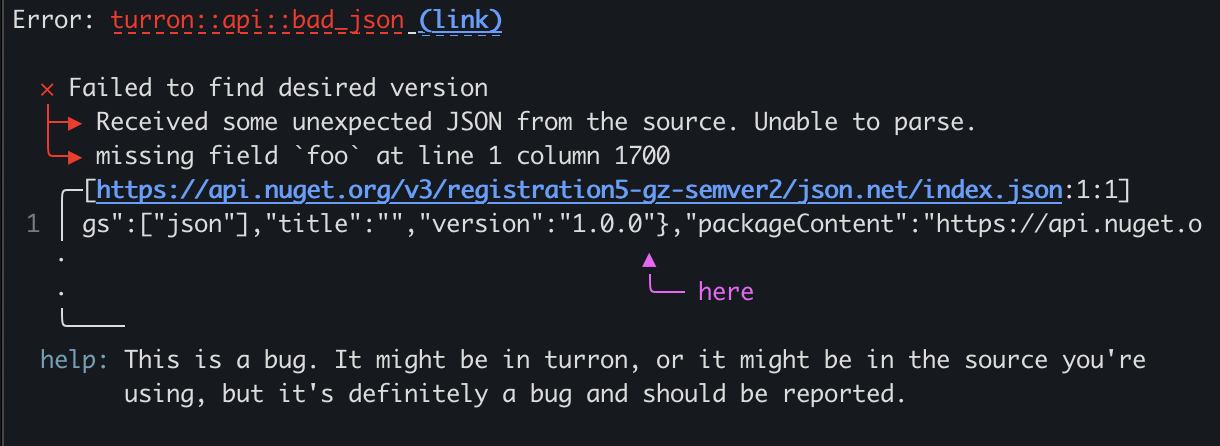Dealing with Errors
인용: Dragon Book
대부분의 프로그래밍 언어 사양에는 컴파일러가 오류에 어떻게 대응해야 하는지에 대한 설명이 없으며, 오류 처리는 컴파일러 설계자에게 맡겨져 있습니다. 처음부터 오류 처리를 계획하면 컴파일러의 구조를 단순화하고 오류 처리를 개선할 수 있습니다.
완전히 복구 가능한 파서는 우리가 어떤 것을 던져도 AST를 구성할 수 있습니다. linter나 formatter와 같은 도구의 경우, 프로그램 일부에 동작할 수 있도록 완전히 복구 가능한 파서를 원할 것입니다.
패닉 파서는 문법 불일치가 있으면 중단하고, 부분적으로 복구 가능한 파서는 결정론적 문법에서 복구합니다.
예를 들어, 문법적으로 잘못된 동안 문 while true {}가 주어지면 대괄호가 누락되었다는 것을 알 수 있습니다,
그리고 포함될 수 있는 유일한 구두점은 대괄호뿐이므로 여전히 유효한 AST를 반환하고 누락된 대괄호를 표시할 수 있습니다.
대부분의 자바스크립트 파서는 부분적으로 복구가 가능하므로, 저희도 마찬가지로 부분적으로 복구 가능한 파서를 만들겠습니다.
Rome 은 완전 복구 가능한 파서입니다.
Rust에는 오류를 반환하고 전파하기 위한 Result 타입이 있습니다.
구문 ?와 함께 사용하면 구문 분석 함수가 간단하고 깔끔하게 유지됩니다.
나중에 오류를 대체할 수 있도록 결과 타입을 래핑하는 것이 일반적입니다:
pub type Result<T> = std::result::Result<T, ()>;
예를 들어 파싱 함수는 Result를 반환합니다:
pub fn parse_binding_pattern(&mut self, ctx: Context) -> Result<BindingPattern<'a>> {
match self.cur_kind() {
Kind::LCurly => self.parse_object_binding_pattern(ctx),
Kind::LBrack => self.parse_array_binding_pattern(ctx),
kind if kind.is_binding_identifier() => {
// ... code omitted
}
_ => Err(()),
}
}
현재 토큰이 문법과 일치하지 않을 경우 오류를 반환하는 expect 함수를 추��가할 수 있습니다:
/// Expect a `Kind` or return error
pub fn expect(&mut self, kind: Kind) -> Result<()> {
if !self.at(kind) {
return Err(())
}
self.advance();
Ok(())
}
이대로 사용해보세요:
pub fn parse_paren_expression(&mut self, ctx: Context) -> Result<Expression> {
self.expect(Kind::LParen)?;
let expression = self.parse_expression(ctx)?;
self.expect(Kind::RParen)?;
Ok(expression)
}
lexing 안에 예상치 못한 char가 발견되는 경우.
완전성을 위해, lexer 함수 read_next_token은 예상치 못한 문자가 발견될 때 Result도 반환해야 합니다.
The Error Trait
특정 오류를 반환하려면 Result의 Err 부분을 채워야 합니다:
pub type Result<T> = std::result::Result<T, SyntaxError>;
^^^^^^^^^^^
#[derive(Debug)]
pub enum SyntaxError {
UnexpectedToken(String),
AutoSemicolonInsertion(String),
UnterminatedMultiLineComment(String),
}
ECMAScript 사양의 문법 섹션에 정의된 모든 "early error"는 구문 오류이므로 이를 SyntaxError라고 부릅니다.
이를 제대로 된 Error로 만들려면 Error Trait를 구현해야 합니다. 더 깔끔한 코드를 위해 thiserror crate에서 매크로를 사용할 수 있습니다:
#[derive(Debug, Error)]
pub enum SyntaxError {
#[error("Unexpected Token")]
UnexpectedToken,
#[error("Expected a semicolon or an implicit semicolon after a statement, but found none")]
AutoSemicolonInsertion,
#[error("Unterminated multi-line comment")]
UnterminatedMultiLineComment,
}
그런 다음 토큰이 일치하지 않을 경우 오류를 던지는 expect 헬퍼 함수를 추가할 수 있습니다:
/// Expect a `Kind` or return error
pub fn expect(&mut self, kind: Kind) -> Result<()> {
if self.at(kind) {
return Err(SyntaxError::UnExpectedToken);
}
self.advance(kind);
Ok(())
}
parse_debugger_statement가 expect 함수를 사용할 수 있게되어 적절한 오류를 관리할 수 있습니다:
fn parse_debugger_statement(&mut self) -> Result<Statement> {
let node = self.start_node();
self.expect(Kind::Debugger)?;
Ok(Statement::DebuggerStatement {
node: self.finish_node(node),
})
}
expect 뒤에 있는 ?를 보세요,
이것은 syntactic sugar "question mark operator"으로 expect 함수가 Err를 반환하는 경우에 함수를 조기에 반환하는 것입니다.
Fancy Error Report
miette는 가장 멋진 오류 보고 crete 중 하나입니다,
멋진 색상의 출력을 제공합니다.

miette를 우리 Cargo.toml에 추가해보죠
[dependencies]
miette = { version = "5", features = ["fancy"] }
Error를 miette로 감쌈으로 파서에 정의된 Result 타입을 수정하지 않아도 됩니다.
pub fn main() -> Result<()> {
let source_code = "".to_string();
let file_path = "test.js".to_string();
let mut parser = Parser::new(&source_code);
parser.parse().map_err(|error| {
miette::Error::new(error).with_source_code(miette::NamedSource::new(file_path, source_code))
})
}